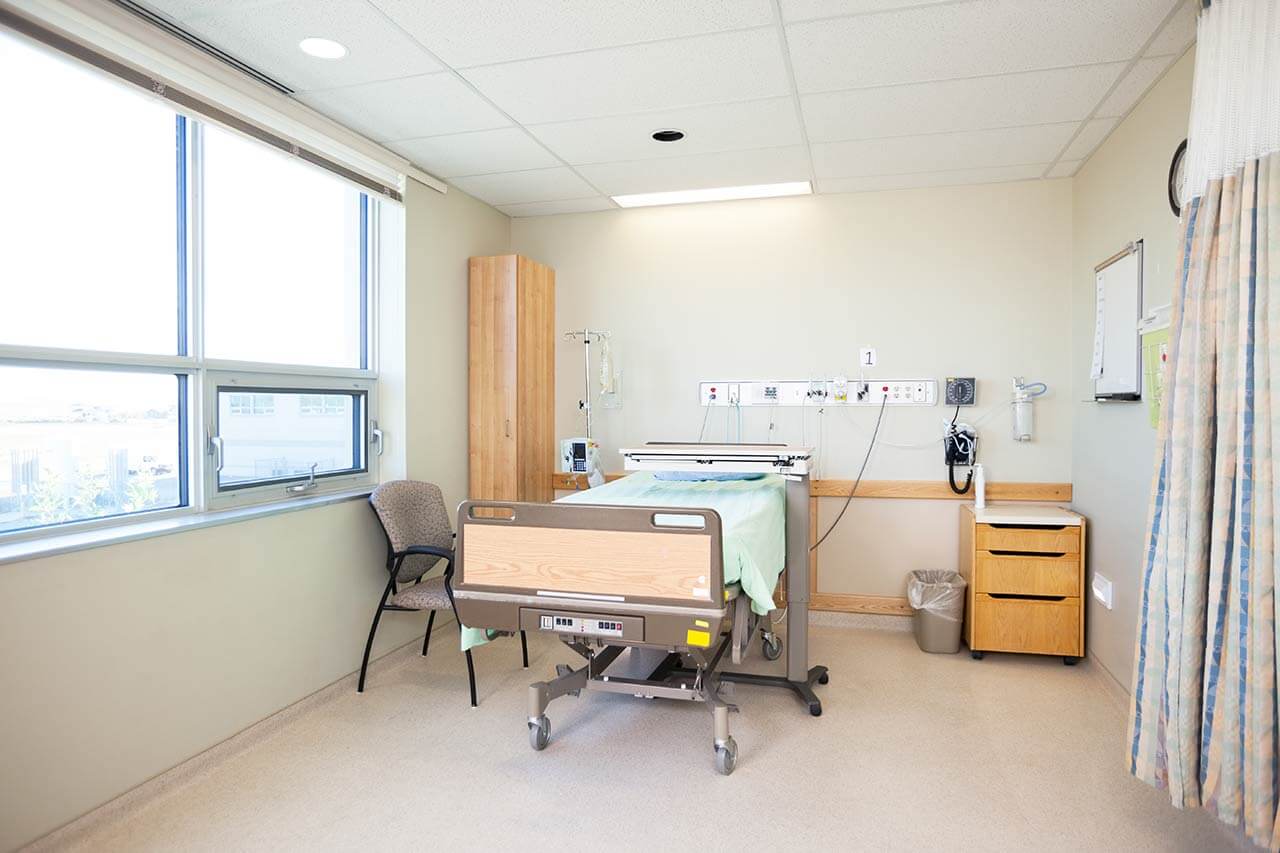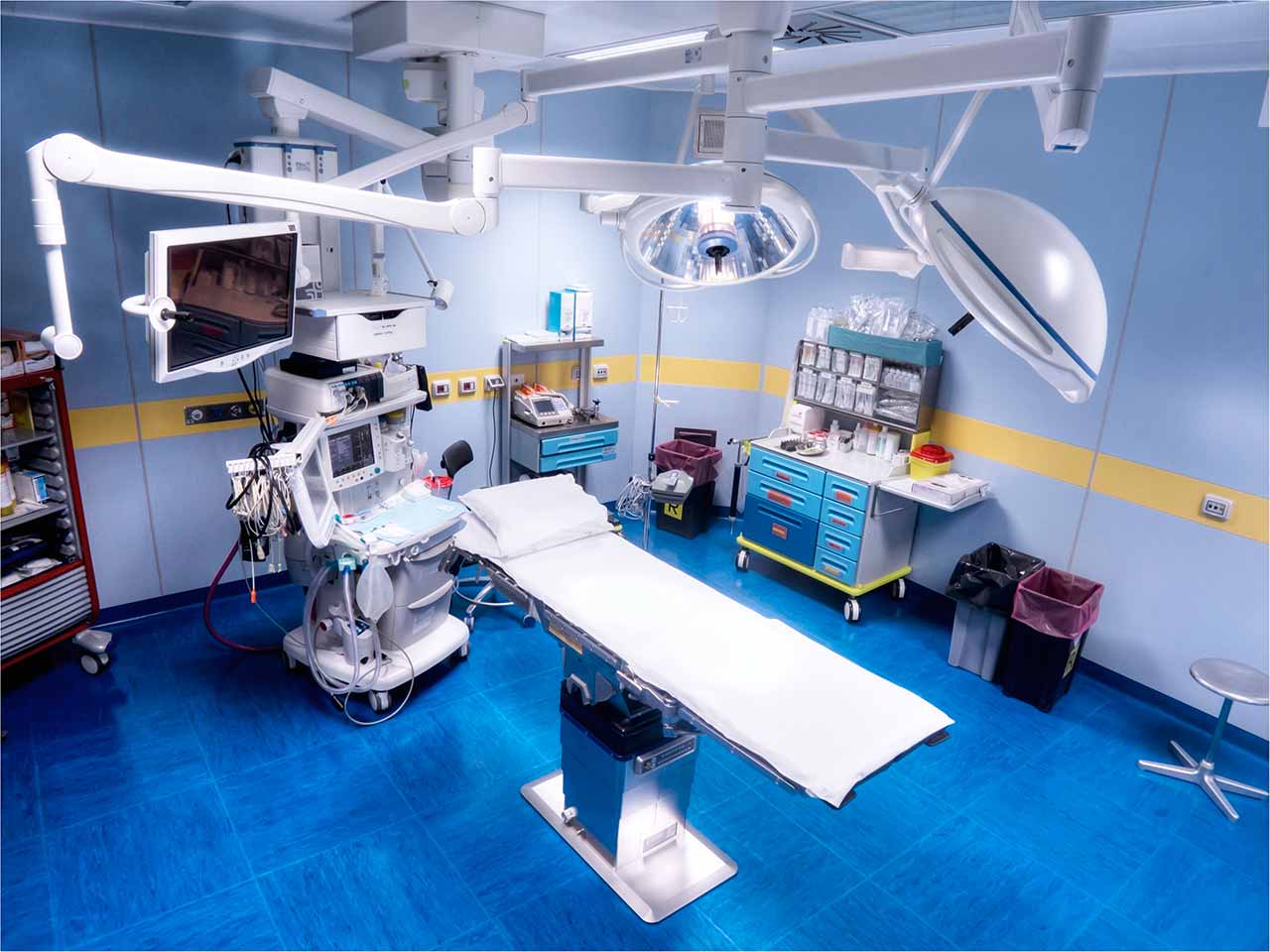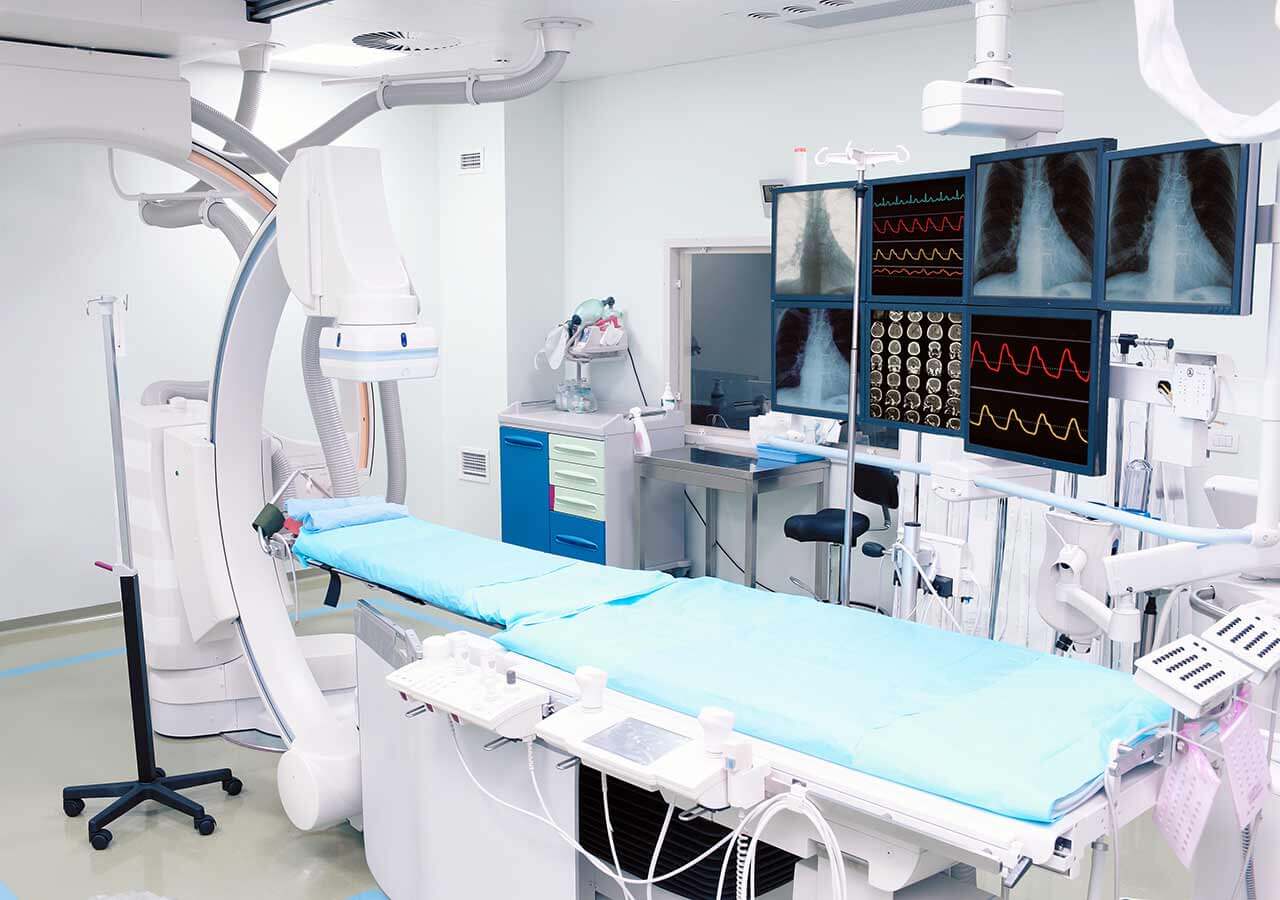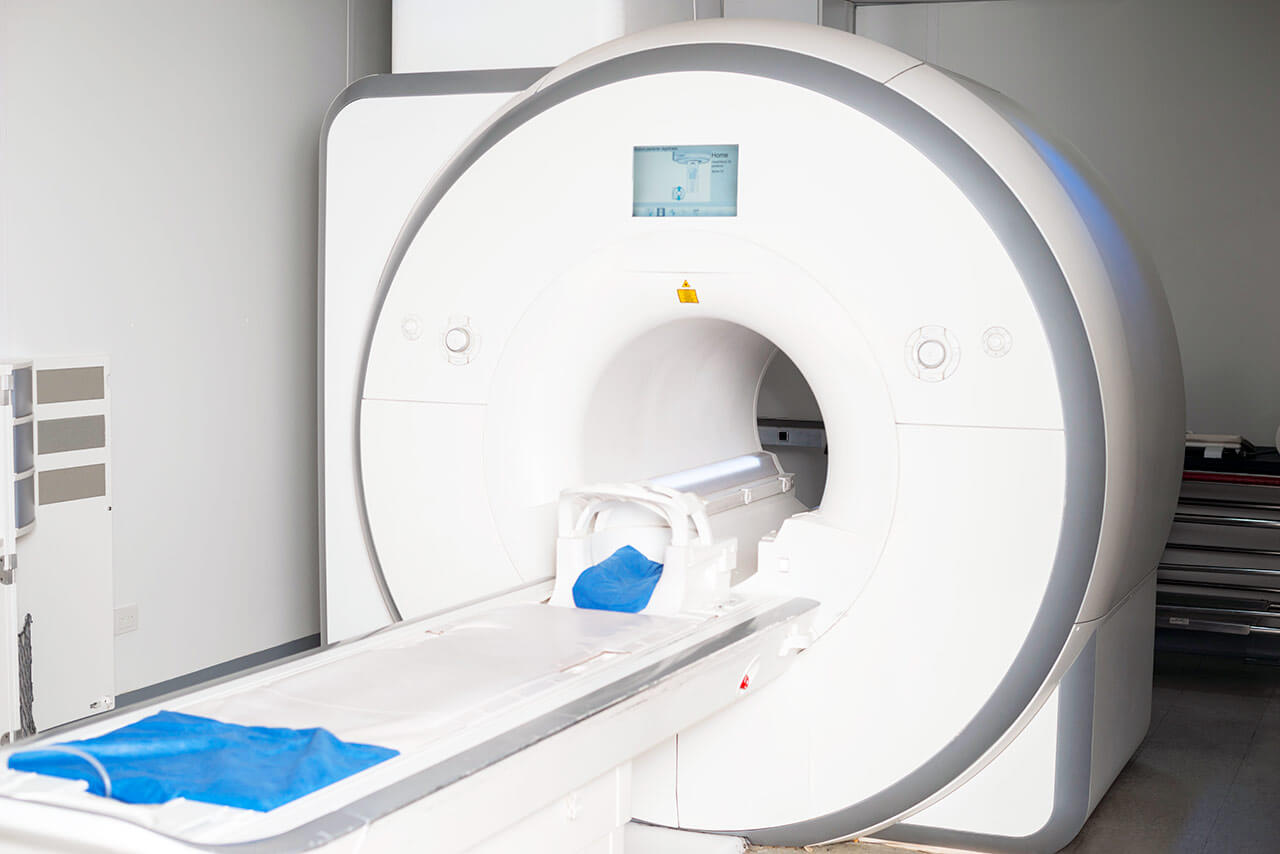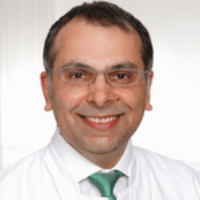
The program includes:
- Initial presentation in the clinic
- clinical history taking
- general clinical examination
- laboratory tests:
- complete blood count
- general urine analysis
- biochemical analysis of blood
- TSH-basal, fT3, fT4
- tumor markers
- thyroid autoantibodies
- indicators of inflammation
- indicators of blood coagulation
- thyroid ultrasound
- CT scan of the thyroid gland (on indication 650 €)
- MRI scan of the thyroid gland (on indication 1200 €)
- thyroid scintigraphy
- biopsy of the thyroid tumor with histological examination (on indication 2000 €)
- nursing services
- consultation of related specialists
- consultation of the chief physician and all leading experts
- development of individual treatment plan
- written statement
Required documents
- Medical records
- MRI/CT scan (not older than 3 months)
- Biopsy results (if available)
Service
You may also book:
 BookingHealth Price from:
BookingHealth Price from:
About the department
The Department of General and Abdominal Surgery, Hepatobiliary Surgery, Endocrine Surgery and Hernia Surgery at the St. Anna Hospital Herne offers the full range of medical services in the fields of its competence. The department performs surgery to treat stomach, esophageal, liver, gallbladder, pancreatic, bowel, peritoneal, spleen and thyroid diseases. In addition, the team of the department's surgeons successfully carries out treatment of various types of hernias: inguinal, umbilical, diaphragmatic, femoral and incisional. Of particular interest is the treatment of abdominal cancers – the department is certified by the German Cancer Society as the Bowel, Pancreatic and Esophageal Cancer Center. Whenever possible, preference is given to minimally invasive surgical techniques. The department's doctors make sure that each patient receives the most effective treatment that meets modern standards of European medicine. The department is headed by Dr. med. Nurettin Albayrak.
An important place in the department's clinical practice is given to the surgical treatment of intestinal diseases. The specialists of the medical facility perform surgery for inflammatory bowel disease (Crohn's disease and ulcerative colitis), intestinal obstruction, intestinal bleeding, diverticular disease, and colon polyps. The department also successfully performs bowel cancer treatment. As in other types of oncology, the chances of full recovery are significantly increased when pathology is detected at the early stage. When performing the operation, the surgeon removes the tumor and the area of the bowel affected by cancer, and then sutures the walls of the organ. The adjacent lymph nodes are also removed. After surgery, the patient often requires additional conservative therapy: chemotherapy and/or radiation therapy. The essence of the treatment of advanced stage of bowel cancer is to slow down the progression of the pathology, relieve pain and improve the patient's quality of life.
The department admits many patients with stomach diseases. The most common pathologies include gastric ulcers, polyps, and stomach cancer. As a rule, drug therapy and diet therapy are sufficient for the treatment of gastric ulcers, and the surgery is performed only in case of complications of the pathology – perforation or bleeding. The interventions to treat gastric ulcers are performed using laparoscopic techniques. In case of gastric polyps, gastroscopy is usually performed (endoscopic removal of benign neoplasms through the esophagus). The surgical intervention is indicated only when large polyps are detected. The main treatment for gastric cancer is surgical resection of a malignant tumor, and quite often partial or total stomach removal (subtotal or total gastrectomy). The optimal type of surgical intervention is determined depending on the type of tumor, its location, size, presence or absence of metastases and other clinical data.
The focus of the department's hepatobiliary surgeons is on patients with diseases of the liver (cysts, benign tumors and liver cancer) and gallbladder (cholelithiasis, inflammatory gallbladder lesions, benign and malignant neoplasms). Surgical interventions for the treatment of the above mentioned pathologies are performed with the use of minimally invasive techniques, without abdominal opening. Thus, surgical risks are reduced to almost zero, and recovery from the intervention is very fast.
In the field of endocrine surgery, special attention is paid to the treatment of thyroid diseases: diffuse enlargement of the thyroid gland, nodules and thyroid cancer. In the case of goiter, both medical and surgical treatment, or a combination of both, is possible. Should thyroid cancer be confirmed, the main treatment will be surgery to remove the affected organ. In this case, minimally traumatic endoscopic surgical techniques are most often used. The surgery for differentiated thyroid cancer is mostly followed by radioiodine therapy, which allows for the destruction of residual malignant cells. After the surgical treatment of undifferentiated types of thyroid cancer, radiation therapy is indicated to patients; in rare cases, chemotherapy is also provided.
The department's therapeutic offer is complemented by hernia surgery. The department's specialization in this medical field includes surgical repair of inguinal, umbilical, diaphragmatic, femoral and incisional hernias. As a rule, hernia surgery is performed with the use of minimally invasive surgical techniques. In some cases, plastic surgery is also required. Prior to the operation, the attending physician develops the optimal treatment regimen and tells the patient in detail about the stages of the upcoming surgical procedure.
The department's range of medical services includes:
- General and abdominal surgery
- Surgical treatment of bowel diseases
- Inflammatory bowel disease (Crohn's disease and ulcerative colitis)
- Bowel obstruction
- Intestinal bleeding
- Diverticular disease
- Bowel polyps
- Bowel cancer
- Surgical treatment of esophageal diseases
- Esophageal diverticulum
- Gastroesophageal reflux disease
- Benign esophageal tumors
- Esophageal cancer
- Surgical treatment of stomach diseases
- Gastric ulcer
- Gastric polyps
- Gastric cancer
- Surgical treatment of pancreatic diseases
- Acute and chronic pancreatitis
- Pancreas divisum
- Pancreatic cancer
- Surgical treatment of peritoneal diseases
- Peritonitis
- Peritoneal carcinomatosis
- Surgical treatment of spleen diseases
- Ruptured spleen
- Spleen infarction
- Surgical treatment of bowel diseases
- Hepatobiliary surgery
- Surgical treatment of liver diseases
- Liver cysts
- Benign liver tumors
- Liver cancer
- Surgical treatment of gallbladder diseases
- Cholelithiasis
- Inflammatory gallbladder lesions
- Benign gallbladder tumors
- Gallbladder cancer
- Surgical treatment of liver diseases
- Endocrine surgery
- Surgical treatment of thyroid diseases
- Goiter
- Thyroid cancer
- Surgical treatment of thyroid diseases
- Surgical treatment of hernias
- Inguinal hernia
- Umbilical hernia
- Diaphragmatic hernia
- Femoral hernia
- Incisional hernia
- Other surgical options
Photo of the doctor: (c) St. Anna Hospital Herne
About hospital
According to the famous Focus magazine, the St. Anna Hospital Herne ranks among the best medical facilities in North Rhine-Westphalia!
The hospital first opened its doors to patients on September 27, 1901, and therefore it is rightfully proud of its long history and successful treatment results. Initially, the hospital had only 40 beds, and today it offers 380 beds for the accommodation of inpatients. The patients benefit from perfectly equipped diagnostic rooms, operating rooms and treatment rooms, in which therapeutic procedures and surgical interventions of any severity are performed.
The hospital has over 1,400 employees. The doctors of the medical facility annually admit about 32,100 inpatients, and more than 56,300 outpatients receive high-quality medical care. The specialists provide services to patients from their region and other federal states of Germany, as well as to patients from other countries of the world. The medical team of the hospital strives to provide each patient with optimal treatment in the most comfortable conditions and in a friendly environment.
The hospital specializes in the following medical fields: orthopedics and traumatology, general and abdominal surgery, internal medicine, gastroenterology, oncology, gynecology, obstetrics and mammology. Each of the medical directions is represented by a specially trained team of doctors who possess deep knowledge and rich clinical experience in their area of specialization. It should be noted that the Department of Orthopedics and Traumatology is one of the largest and best in the whole of Germany. Other departments of the hospital also demonstrate excellent results, which are confirmed by various quality certificates, including certificates of the German Cancer Society, the German Hernia Society, and the German Spine Society.
Photo: (с) depositphotos
Accommodation in hospital
Patients rooms
The patients of the St. Anna Hospital Herne are offered accommodation in single rooms and rooms designed for several people. All rooms are bright, have a modern design and all the necessary amenities. The furnishings of the standard patient room include an automatically adjustable bed, a bedside table with a locker, a wardrobe, a table and chairs, a TV, and a telephone. Each patient room has an ensuite bathroom with shower and toilet.
Patients can also choose to stay in enhanced comfort rooms. These rooms provide patients with a comfortable bed, a refrigerator, a safe and a TV with a DVD player. If desired, one can also connect to Wi-Fi. The patient can also independently adjust the brightness of the lighting in the patient room. In addition, the enhanced comfort room has a glazed balcony with a seating area.
Meals and Menus
The patients of the hospital are offered tasty and healthy three meals a day. The patients have a choice of buffet meals for breakfast and dinner, and there is a choice of several set menus for lunch. Patients are offered tea, coffee, mineral water and juices at any time.
If for some reason you do not eat all foods, you will be offered an individual menu. Please inform the medical staff about your food preferences prior to treatment.
Further details
Standard rooms include:
Television
You can listen to 4 radio programs and watch 30 television programs through the headphones at the patient's bed.
Religion
Religious services are available upon request.
Accompanying person
Your accompanying person may stay with you in your patient room or at the hotel of your choice during the inpatient program.
Hotel
You may stay at the hotel of your choice during the outpatient program. Our managers will support you for selecting the best option.
